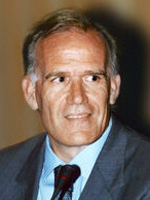미국이 최근 군사개입을 했던 나라들을 살펴보면 놀라서 입이 벌어진다. 캄보디아, 이란, 리비아, 레바논, 그레나다, 파나마, 라이베리아, 이라크, 아이티, 소말리아, 전 유고연방, 자이르, 아프가니스탄이 개입한 나라들 가운데 포함된다.
 |
| 빅터 데이비스 핸슨 美 후버연구소 역사학자 |
이런 군대파견 가운데 일부는 효과를 발휘하여 미국 및 동맹국들의 국가이익을 신장시켰거나 인도주의적인 목적 달성에 기여했다. 제2차 세계대전 후 그리스가 공산주의로부터 구원받았다. 쿠웨이트를 침공했던 이라크 독재자 사담 후세인이 격퇴 당했고 나중에는 자국에서도 축출되었다. 마약밀매를 일삼은 파나마 독재자 마누엘 노리에가를 권좌에서 끌어내린 것도 미군이다.
미국의 비공식적인 전쟁행위가 상황을 악화시킨 경우도 많았다. 과거의 개입 사례들이 미래의 개입전쟁에 길잡이 노릇을 할 수 있을까. 대통령이 미 의회에 전쟁 승인을 요청한 경우도 간혹 있었다. 부시 부자의 두 차례 이라크 전쟁이 그 예다. 의회 승인 없이 공격을 감행한 경우도 있었다. 빌 클린턴이 발칸에서 그랬다.
베트남 전쟁과 전쟁수권법이 미 의회를 통과한 뒤 대통령이 개입에 대한 의회의 승인을 요청할 가능성이 높아진 듯이 보였으나 현실로 나타나지는 않았다. 레이건 외에 많은 대통령들이 의회 승인을 요청하지 않은 상태에서 리비아를 폭격했고 그레나다 등에 침공했다.
미국의 개입 동기도 광범하게 다양하다. 리비아와 아프가니스탄 폭격은 보복조치였다. 한국전쟁 참전은 유엔결의안을 이행하는 데 목적이 있었다. 세르비아 폭격은 대규모 학살을 방지하기 위해서였다. 소말리아는 인도주의를 위해, 베트남은 동맹국을 돕기 위해, 이라크와 리비아는 정권교체를 위해, 중앙아메리카는 미국의 상업적 이익 보호를 위해, 그레나다는 외국의 유해한 외교활동 차단을 위해 개입했다.
미 해병대의 1804년 트리폴리 침공 이후 모든 개입을 종합해 보면 일정한 패턴이 나타난다. 즉 목적이 분명하고 개입이 단호할수록 성공 가능성이 높다. 또한 분쟁지역의 즉각적인 상황 호전이나 승리가 국민의 지지를 확보하는 데 필수적이었다.
잘못된 판단으로 개입이 재난을 초래하고 목적 달성을 하지 못하더라도 실패가 단기간에 그치고 작전이 신속하게 종료될 경우 국민의 분노는 오래 가지 않았다. 그에 비해 전쟁이 장기화되고 수많은 미국인이 목숨을 잃은 한국전쟁과 이라크 전쟁 같은 경우 지역의 상황을 개선시키더라도 국민의 지지를 잃었다.
시리아 반군 내부의 다양한 세력을 구별하기 어렵고 미국이 제한적인 무력 사용을 미리 선언한 사실에 비추어볼 때 시리아 폭격에서 좋은 결과를 기대하기는 어렵다.
빅터 데이비스 핸슨 美 후버연구소 역사학자
워싱턴타임스·정리=오성환 외신전문위원
Same old, same old in Syria
By Victor Davis Hanson
U.S. interventions have been all over the map, and so have their results
President Obama's on-and-off-again planned American attack on Syria is nothing new. Besides its five declared wars, America has a habit of intervening all over the world.
Even apart from clandestine CIA operations, and even after the unhappy end of the Vietnam War, we have attacked lots of countries and non-state militias.
The roll call of recent American military interventions is quite astounding: Cambodia, Iran, Libya, Lebanon, Grenada, Panama, Liberia, Iraq, Haiti, Somalia, the former Yugoslavia, Zaire and Afghanistan.
The notion of past American isolationism is a myth. In the four years between 1912 and 1916 alone, the U.S. sent troops into Cuba, Panama, Honduras, Nicaragua, Mexico, the Dominican Republic and Haiti.
Even those busy years of intervention were not novel. Since our infancy, the U.S. military has been constantly engaged. In another four-year period, between 1812 and 1816, America fought the British, the French, the Spanish and the North Africans.
Some of these deployments were effective, either furthering American and allied interests or serving a common humanitarian purpose. Greece was saved from communism after World War II. Saddam Hussein was forced out of Kuwait and, ultimately, Iraq. Dictator and drug-dealer Manuel Noriega was deposed from Panama. At other times, our periodic undeclared wars just made things worse.
With Mr. Obama contemplating bombing Syria, is there any guide from the past about whether yet another attack is wise or silly?
Sometimes, the president sought congressional approval (e.g., both Bushes in the two Iraq wars). At other times, he attacked without authorization (Bill Clinton in the Balkans). Obtaining a United Nations resolution seemed wise before the first Gulf War, but proved impossible in the Balkan bombing.
After Vietnam and the passage of the War Powers Act, it was more likely for a president to seek congressional authorization, but again not always. Ronald Reagan, like many others, bombed the Libyans and invaded Grenada without asking Congress.
Sometimes, the undeclared interventions cost Americans tens of thousands of lives (Korea and Vietnam). But often, very few were killed (Panama and Grenada). The interventions could last just a few days, as when Mr. Clinton sent missiles and bombs into Afghanistan, East Africa and Iraq, or years on end such as the costly ground fighting in Afghanistan, Iraq and Vietnam.
Our supposed motives varied widely - whether revenge (bombing Libya and Afghanistan), enforcing U.N. resolutions (Korea), the prevention of genocide (Serbia), humanitarianism (Somalia), helping allies (Vietnam), regime change (Iraq and Libya), protecting U.S. commercial interests (Central America) or harming foreign efforts (Grenada).
If we collate all the interventions since the Marines invaded Tripoli in 1804, a certain pattern emerges. The more clearly defined and decisive the intervention, the more likely it was judged successful. In addition, making progress or winning outright was essential to ensuring public support.
Even disastrous and ill-thought-out interventions that accomplished nothing or made things worse, such as Gerald Ford's 1975 attack in Cambodia, Jimmy Carter's failed Iran rescue mission (1980) or Reagan's intervention in Lebanon (1982-83) did not cause lasting popular outrage - given that setbacks were brief and the operations quickly ended.
In contrast, any war that drags on and costs thousands of American lives - whether in Afghanistan, Iraq, Korea, the Philippines or Vietnam - proves unpopular, even when they sometimes succeed in deposing tyrants and putting something better in their place.
In this regard, we should not expect much good from bombing Syria, given the difficulty of sorting out the various insurgents and our loud prior announcements of limiting the use of force.
To the degree we are not willing to insert ground troops, it is more likely both that we won't accomplish much and won't get trapped in a quagmire.
It is wiser to obtain congressional approval, and the more foreign allies that join the better. Having a clear objective, a sound methodology and a definition of victory is essential - whether in big or small interventions.
So far, the president can't decide on the real objective in Syria, much less how to obtain it. Is the goal the elimination of weapons of mass destruction, the punishment of President Bashar Assad for using these weapons, restoring the president's credibility after unwisely issuing red lines, immediate U.S. national security interests, the removal of Mr. Assad himself or help for the insurgents?
If the president neither obtains congressional approval nor makes the attempt to go the United Nations, the attack will probably be unpopular abroad - even more so without any allies or American public support.
Finally, promising in advance that whatever we do will probably be short and limited will make it likely that, if it fails, it will be forgiven and forgotten. If it is deemed successful, it will have little, if any, lasting, strategic effects.
By Victor Davis Hanson
U.S. interventions have been all over the map, and so have their results
President Obama's on-and-off-again planned American attack on Syria is nothing new. Besides its five declared wars, America has a habit of intervening all over the world.
Even apart from clandestine CIA operations, and even after the unhappy end of the Vietnam War, we have attacked lots of countries and non-state militias.
The roll call of recent American military interventions is quite astounding: Cambodia, Iran, Libya, Lebanon, Grenada, Panama, Liberia, Iraq, Haiti, Somalia, the former Yugoslavia, Zaire and Afghanistan.
The notion of past American isolationism is a myth. In the four years between 1912 and 1916 alone, the U.S. sent troops into Cuba, Panama, Honduras, Nicaragua, Mexico, the Dominican Republic and Haiti.
Even those busy years of intervention were not novel. Since our infancy, the U.S. military has been constantly engaged. In another four-year period, between 1812 and 1816, America fought the British, the French, the Spanish and the North Africans.
Some of these deployments were effective, either furthering American and allied interests or serving a common humanitarian purpose. Greece was saved from communism after World War II. Saddam Hussein was forced out of Kuwait and, ultimately, Iraq. Dictator and drug-dealer Manuel Noriega was deposed from Panama. At other times, our periodic undeclared wars just made things worse.
With Mr. Obama contemplating bombing Syria, is there any guide from the past about whether yet another attack is wise or silly?
Sometimes, the president sought congressional approval (e.g., both Bushes in the two Iraq wars). At other times, he attacked without authorization (Bill Clinton in the Balkans). Obtaining a United Nations resolution seemed wise before the first Gulf War, but proved impossible in the Balkan bombing.
After Vietnam and the passage of the War Powers Act, it was more likely for a president to seek congressional authorization, but again not always. Ronald Reagan, like many others, bombed the Libyans and invaded Grenada without asking Congress.
Sometimes, the undeclared interventions cost Americans tens of thousands of lives (Korea and Vietnam). But often, very few were killed (Panama and Grenada). The interventions could last just a few days, as when Mr. Clinton sent missiles and bombs into Afghanistan, East Africa and Iraq, or years on end such as the costly ground fighting in Afghanistan, Iraq and Vietnam.
Our supposed motives varied widely - whether revenge (bombing Libya and Afghanistan), enforcing U.N. resolutions (Korea), the prevention of genocide (Serbia), humanitarianism (Somalia), helping allies (Vietnam), regime change (Iraq and Libya), protecting U.S. commercial interests (Central America) or harming foreign efforts (Grenada).
If we collate all the interventions since the Marines invaded Tripoli in 1804, a certain pattern emerges. The more clearly defined and decisive the intervention, the more likely it was judged successful. In addition, making progress or winning outright was essential to ensuring public support.
Even disastrous and ill-thought-out interventions that accomplished nothing or made things worse, such as Gerald Ford's 1975 attack in Cambodia, Jimmy Carter's failed Iran rescue mission (1980) or Reagan's intervention in Lebanon (1982-83) did not cause lasting popular outrage - given that setbacks were brief and the operations quickly ended.
In contrast, any war that drags on and costs thousands of American lives - whether in Afghanistan, Iraq, Korea, the Philippines or Vietnam - proves unpopular, even when they sometimes succeed in deposing tyrants and putting something better in their place.
In this regard, we should not expect much good from bombing Syria, given the difficulty of sorting out the various insurgents and our loud prior announcements of limiting the use of force.
To the degree we are not willing to insert ground troops, it is more likely both that we won't accomplish much and won't get trapped in a quagmire.
It is wiser to obtain congressional approval, and the more foreign allies that join the better. Having a clear objective, a sound methodology and a definition of victory is essential - whether in big or small interventions.
So far, the president can't decide on the real objective in Syria, much less how to obtain it. Is the goal the elimination of weapons of mass destruction, the punishment of President Bashar Assad for using these weapons, restoring the president's credibility after unwisely issuing red lines, immediate U.S. national security interests, the removal of Mr. Assad himself or help for the insurgents?
If the president neither obtains congressional approval nor makes the attempt to go the United Nations, the attack will probably be unpopular abroad - even more so without any allies or American public support.
Finally, promising in advance that whatever we do will probably be short and limited will make it likely that, if it fails, it will be forgiven and forgotten. If it is deemed successful, it will have little, if any, lasting, strategic effects.
[ⓒ 세계일보 & Segye.com, 무단전재 및 재배포 금지]
![[설왕설래] “내 전임자는 바쁘다”](http://img.segye.com/content/image/2024/04/19/128/20240419515315.jpg
)
![[기자가만난세상] ‘세월호 증인’ 팽목항 기억되길](http://img.segye.com/content/image/2024/04/19/128/20240419515247.jpg
)
![[조경란의얇은소설] 아버지가 지금 있는 곳](http://img.segye.com/content/image/2021/10/29/128/20211029514141.jpg
)
![[박일호의미술여행] 싸움은 이제 그만](http://img.segye.com/content/image/2024/04/19/128/20240419515306.jpg
)








